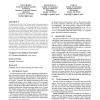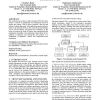WWW
2004
ACM
15 years 1 months ago
2004
ACM
In this paper, we address the problem of matching I/O descriptions of services to enable their automatic service composition. Specifically, we develop a method of semantic schema ...
WWW
2004
ACM
15 years 1 months ago
2004
ACM
The Internet and the World Wide Web have enabled a publishing explosion of useful online information, which has produced the unfortunate side effect of information overload: it is...
WWW
2004
ACM
15 years 1 months ago
2004
ACM
This paper presents KnowledgeTree, an architecture for adaptive E-Learning based on distributed reusable intelligent learning activities. The goal of KnowledgeTree is to bridge th...
WWW
2004
ACM
15 years 1 months ago
2004
ACM
We present a framework for approximating random-walk based probability distributions over Web pages using graph aggregation. We (1) partition the Web's graph into classes of ...
WWW
2004
ACM
15 years 1 months ago
2004
ACM
In this poster we introduce ProThes, a pilot meta-search engine (MSE) for a specific application domain. ProThes combines three approaches: meta-search, graphical user interface (...
WWW
2004
ACM
15 years 1 months ago
2004
ACM
In the problem of learning with positive and unlabeled examples, existing research all assumes that positive examples P and the hidden positive examples in the unlabeled set U are...
WWW
2004
ACM
15 years 1 months ago
2004
ACM
We present enhancements for UDDI / DAML-S registries allowing cooperative discovery and selection of Web services with a focus on personalization. To find the most useful service ...
WWW
2004
ACM
15 years 1 months ago
2004
ACM
The current discussion about a future Semantic Web trust architecture is focused on reputational trust mechanisms based on explicit trust ratings. What is often overlooked is the ...
WWW
2004
ACM
15 years 1 months ago
2004
ACM
The evaluation of eLearning success is an indispensable business requirement of education programs: the easy registration of `visits' to eLearning websites is, however, not s...
WWW
2004
ACM
15 years 1 months ago
2004
ACM
A number of applications require selecting targets for specific contents on the basis of criteria defined by the contents providers rather than selecting documents in response to ...


